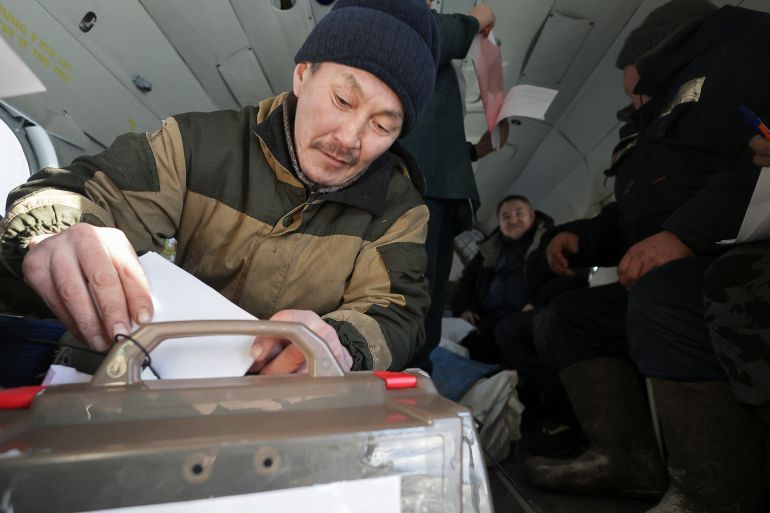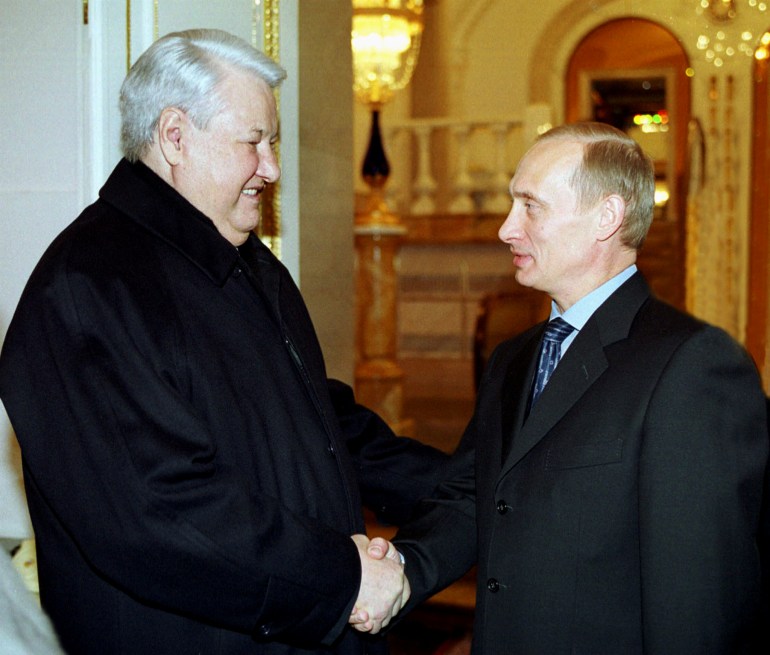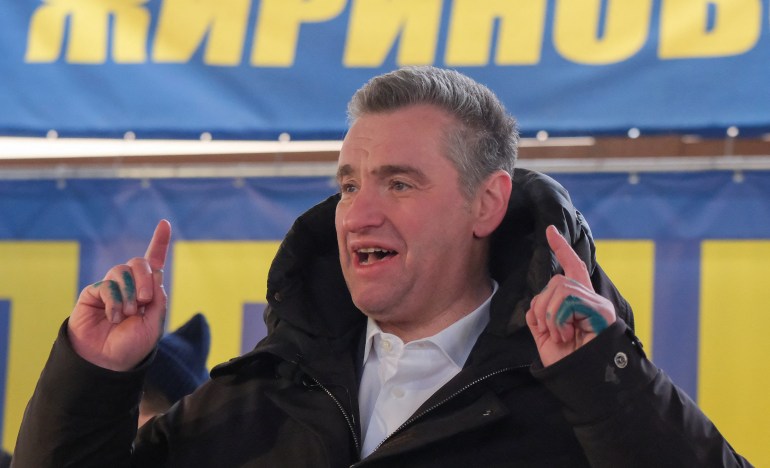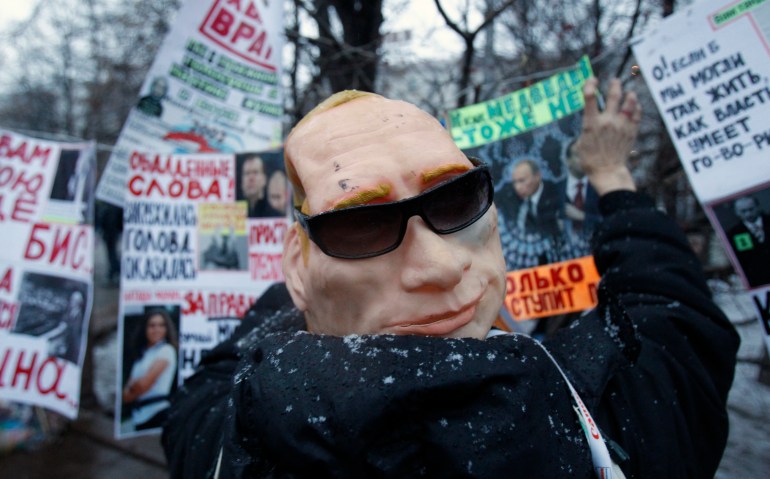Russia’s presidential election: Putin, power, the possibility of protests
The 71-year-old president is all but certain to win another term in a vote that begins on March 15.

Russian President Vladimir Putin is all but certain to win his fifth election.
But according to the 2020 constitutional amendment that “nullified” his previous terms, the March 15-17 election is going to be his “first”.
Keep reading
list of 4 itemsTwo years after Putin ordered a war on Ukraine, what’s changed in Russia?
After Macron touted troops to Ukraine, Putin warns West of nuclear war risk
Navalny’s widow calls for Russia election day protests against Putin
Putin announced his candidacy in December during a choreographed ceremony in a lavishly decorated Kremlin hall when talking to a separatist “colonel” from the southeastern Ukrainian region of Donbas.
“On behalf of all of our people, our Donbas, the lands that reunited [with Russia], I wanted to ask you to take part in this election,” Artyom Zhoga, clad in an impeccable uniform adorned with medals, told Putin.
“I’m not going to hide it, I’ve had different thoughts at different times, but now is the time to make a decision, and I will run,” poker-faced Putin replied.
How many terms has Putin served?
He has served four. He was elected president in 2000 and re-elected in 2004, 2012, and 2018.
If he wins, as expected, he will serve another six years, thanks to constitutional amendments that have expanded the term. This would mark his fifth term.
He can then be re-elected again in 2030 for a sixth term.
That means he could be in power until 2036, when he will be 83 years old.
The 71-year-old ex-KGB spy is already Russia’s longest-serving leader since Soviet leader Josef Stalin.

Putin’s increasingly iron-fisted treatment of opposition, critics and antiwar protesters has been widely compared with Stalin’s “big terror” campaigns.
But to Kremlin loyalists, Putin is a political “genius” who prevented Russia’s disintegration, reigned in billionaire oligarchs and subdued Chechen separatists.
Putin’s supporters also call him a “gatherer of Russian lands”, an honourable sobriquet for Russian princes and czars, for waging the 2008 war on ex-Soviet Georgia, recognising two breakaway Georgian statelets, annexing Crimea in 2014 and parts of four more Ukrainian regions in 2022.
What’s the state of the Russian opposition?
On February 16, Alexey Navalny, Putin’s most outspoken political opponent, died in an Arctic prison in what his family, supporters, and much of the international community claimed was political murder.
Navalny was denied registration in the 2018 presidential election that Putin won with almost 78 percent of the vote.
Two more opposition figures – Ilya Yashin and Vladimir Kaza-Murza – have been sentenced to eight-and-a-half years and 25 years in jail, respectively, for their criticism of Putin’s war in Ukraine.
Thousands more – opposition figures, critics and average Russians who posted an antiwar comment online or simply liked or shared one – have faced criminal charges.
Tens of thousands have been arrested, fined or forced out of the country.
In addition, at least a million Russian men fled after the war, especially following the September 2022 announcement of “mobilisation”.
“I’ve got nothing to do with this farce. They wanted me to die, they wanted my son to be an orphan,” Demyan, a 32-year-old web designer who fled to Georgia and then to southern Portugal in late 2022, told Al Jazeera.
Authorities largely do not prevent their exodus. But they adopted a law allowing confiscation of their property for “criticising the special military operation”, the Kremlin’s preferred euphemism for the war in Ukraine.
How many Russians are ready to vote?
Some 79 percent of Russians intend to vote for Putin, according to a February survey by VTsIOM, a Kremlin-controlled pollster.
Some everyday Russians await the vote with apathy and hopelessness after adapting to the wartime reality around them.
“Everyone seems to have gotten used to the situation, gave up or sometimes even began to gain from it,” Mikhail, a freelance copywriter from a Moscow suburb, told Al Jazeera. “The shock has been replaced with apathy and depression.”
How does the voting process work?
This is the first vote in Russian history that lasts three days instead of one. It is also the first time voters in 29 regions can vote online.
Some 112 million people aged 18 and above in Russia are eligible to vote.
People in annexed Crimea and occupied parts of Ukraine will also vote, a move Kyiv and its Western allies have condemned as illegitimate.
Millions of Russian nationals living abroad – from the Russia-leased spaceport of Baikonur in southern Kazakhstan to California in the United States – can also vote in embassies, consulates or by mail.
At least 61 percent of Russians are “definitely” taking part in the vote, according to a poll by FOM, a Kremlin-funded pollster, released on March 5.
Another 16 percent are “likely” to cast their ballots, and only 9 percent will abstain from the vote, the poll said.
Initial results are expected to be announced on March 19, with the final outcome to be revealed on March 29.
What level of turnout is expected, and will the vote be fair?
The officially-expected turnout is nearly as high as during the 2018 vote, when almost 68 percent of Russians cast their ballots, according to official figures.
In 2018, independent election monitors documented thousands of cases of vote rigging, including ballot stuffing and “carousels”, when hundreds of voters are bussed to multiple polling stations.
Some of the monitors faced threats and were denied access to polling stations.
The vote was “overly controlled” and “lacked genuine competition”, said the Organization for Security and Co-operation in Europe, an international election observer. Authorities coerced government employees, servicemen and law enforcement officers to vote for Putin, it said.
Observers who follow Russian politics have little hope the vote will be carried out in a free and fair manner.
Who is running against Putin?
Putin is running as an independent candidate because the ruling United Russia party is widely seen as corrupt and inefficient.
Late opposition leader Navalny dubbed it the “party of crooks and thieves”.
Other candidates are seen as figureheads whose participation is only supposed to show how “popular” Putin is.
One is Nikolay Kharitonov of the Communist Party. He took part in the 2004 vote and finished a distant second.

Another is Leonid Slutsky of the nationalist Liberal Democratic Party of Russia (LDPR). He has been accused of sexually harassing a journalist. Slutsky called the accusations part of a “conspiracy” against him.
Slutsky replaces Vladimir Zhirinovsky, a flamboyant populist who ran against Putin four times and was widely compared with former United States President Donald Trump, as the LDPR presidential nominee. He died in 2020.
And while the Communist and LDPR candidates are relatively known, the third registered candidate, Vladislav Davankov of the New People party, is obscure and barely known outside Moscow.
All three are part of the “systemic opposition”, a handful of parties with a presence in the State Duma, Russia’s lower house of parliament.
All three back the war in Ukraine and generally support the Kremlin party line.
Between 2 percent and 4 percent of Russians are expected to vote for each of them, according to the VtsIOM poll.
Liberal opposition candidate Boris Nadezhdin was denied registration because of allegedly “invalid” signatures of support in his candidate application.
Nadezhdin, who openly criticised the war in Ukraine, said he would recruit independent election monitors and has promised to keep fighting against the Supreme Court rulings against him. But there is no chance he will be able to run.
He told Al Jazeera in early February that he was excluded “because my election rating, the number of people who are ready to vote for me grows 5 percent a week”.
Are protests likely?
In the winter of 2011-12, some of the largest opposition rallies in Russia’s post-Soviet victory took place after the parliamentary and presidential votes that were widely seen as rigged.
The Kremlin responded with a massive crackdown. It now has more advanced tools to silence opposition – facial recognition software and mobile phone data to identify each protester.
Any protests “will be disunited and badly organised”, said Sergey Biziyukin, an opposition activist from the western city of Ryazan who was forced out of Russia after trying to register for the 2018 presidential vote.
“Most of the populace, irrespective of their attitude to Putin, the elections look staged,” he told Al Jazeera.
